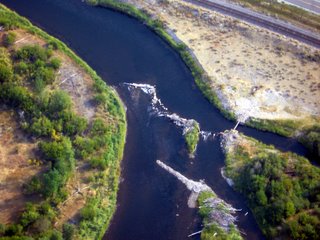
This summer, the Big Hole River has closed to angling. The trigger for this closure was low flows—for example, flows falling below 150 cubic feet per second at Melrose. When the river closes, anglers lose their sport while guides & outfitters lose their living.
Though we had good rainfall and snow pack coming into the summer, it has been very dry and hot since early June. Early on, the city of Butte mandated every-other-day watering since much of our water comes from the Big Hole River. Certainly, it behooves everyone to conserve water.
Yet it seems that some ranchers are not conserving water. In fact, recently several ranchers have constructed large irrigation diversion dams in the Melrose, Glen, and Notchbottom areas of the river. It requires large equipment to construct such dams, as you can see from the attached aerial photograph.
The two large diversion dams in the photograph are located just below Melrose. As you can see from the photo, these two diversions take a great measure of the river’s flow. The same is true of the new diversions constructed below Glen and near Notchbottom.
[In the photo, note that the main flow of the river is from the upper left to the lower left. The first diversion dam diverts water to the first irrigation ditch on the center right. The second diversion diverts water to the ditch on the lower right.]
To operate heavy equipment in the river requires a “310 Permit” – a permit granted by the local Conservation District. Complaints have been filed with the appropriate Conservation District regarding new diversion dams. So far, it appears that these dams were constructed without permits. If so, they are illegal.
If these diversion dams were permitted by the Conservation District, then shame on them for permitting projects so obviously harmful to the river and its fish. In a year when the river is closed to anglers and outfitters, and when the rare Big Hole grayling is edging toward extinction, everyone should be conserving water.
Where is the Big Hole Watershed Committee in this picture? Supposedly, this rancher-dominated group exists to “Foster the ability of local individuals and groups to create effective solutions to local problems; Seek long-term solutions based on sound information; and Serve as a responsible planning entity for developing a coordinated resource plan for the Watershed.” However, the watershed committee seems to be taking no action regarding these harmful and perhaps illegal diversion dams.
As we approach Butte conservationist George Grant’s 100th birthday, we should also remember that George – along with other local conservationists such as Tony Schoonen and Bob Lieneman – helped to create the Streambed Preservation Act in 1975. Let’s honor this legacy by maintaining the minimal flows that fish need and by halting the construction of harmful diversion dams.

No comments:
Post a Comment